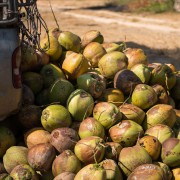Speeches Shim
The Lower Mekong basin is rich in biodiversity. However, there are considerable knowledge gaps in the threats facing existing biodiversity. Through Partnerships for Enhanced Engagement in Research (PEER), USAID is supporting a regional network of scientists to better understand some of the region’s most pressing biodiversity challenges. This support contributes to USAID’s objective of improving natural resource management under the U.S. Government’s Indo-Pacific Vision.

Over one year after an inaugural sustainable coconut roundtable was held in Malaysia, the United States Agency for International Development (USAID) and global cacao corporate, Barry Callebaut, reconvened coconut buyers via webinar on June 30 to continue efforts to prevent a global coconut shortfall through a sustainable sourcing charter. Sustainable sourcing – reducing the social and environmental fallout from coconut production – promises to increase climate-smart coconuts in an industry where demand far outstrips supply.
USAID Mekong Safeguards provides policy makers, government regulators, major financiers, and contractors with the information and tools they need to apply environmental, social, and governance (ESG) standards for infrastructure development in the Lower Mekong region. This activity advances the U.S. Government’s Indo-Pacific Vision by helping Lower Mekong countries build locally-developed solutions, improve transparency in infrastructure decision-making, and accelerate the role of private sector as a driver of development.
The United States Agency for International Development (USAID), through its USAID Green Invest Asia project, facilitated more than 30 Cambodian banks’ carbon accounting efforts as part of a partnership with the Association of Banks in Cambodia. In a May 13 webinar, USAID Green Invest Asia convened consulting firm, South Pole, and Rabo Foundation to share processes and profit incentives for banks to report on carbon emissions.
The USAID Thailand Counter Trafficking in Persons Project (USAID Thailand CTIP) works to reduce trafficking in persons (TIP) and better protect the rights of trafficked persons in Thailand by reducing demand and incentives for using trafficked labor, empowering at-risk populations to safeguard their rights, and strengthening protection systems for survivors. USAID Thailand CTIP supports the Presidential Executive Order on Enforcing Federal Law with Respect to Transnational Criminal Organizations and Preventing International Trafficking and accelerates efforts to implement Thailand’s anti-human trafficking strategy.

Comment
Make a general inquiry or suggest an improvement.